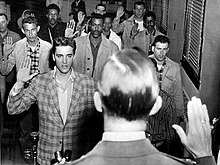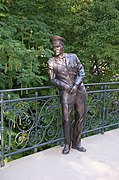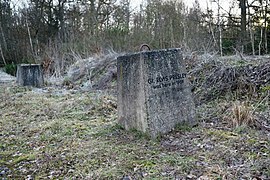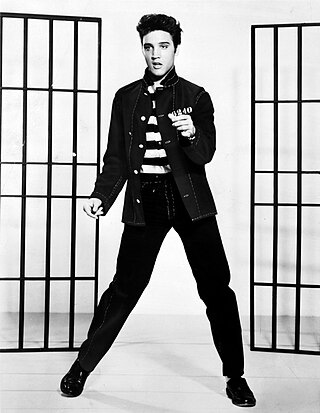
Elvis Aaron Presley, also known mononymously as Elvis, was an American singer and actor. Known as the "King of Rock and Roll", he is regarded as one of the most significant cultural figures of the 20th century. Presley's energized interpretations of songs and sexually provocative performance style, combined with a singularly potent mix of influences across color lines during a transformative era in race relations, brought both great success and initial controversy.

Graceland is a mansion on a 13.8-acre (5.6-hectare) estate in Memphis, Tennessee, United States, once owned by American singer Elvis Presley. Presley is buried there, as are his parents, paternal grandmother, grandson, and daughter.

Priscilla Ann Presley is an American businesswoman and actress. She is the ex-wife of the late American singer Elvis Presley, as well as the cofounder and former chairperson of Elvis Presley Enterprises (EPE), the company that turned Graceland into one of the top tourist attractions in the United States. In her acting career, Presley costarred with Leslie Nielsen in the Naked Gun film trilogy and played Jenna Wade on the long-running television series Dallas.

Thomas Andrew Parker, commonly known as Colonel Parker, was a Dutch-American musical entrepreneur, best known for being Elvis Presley's manager.
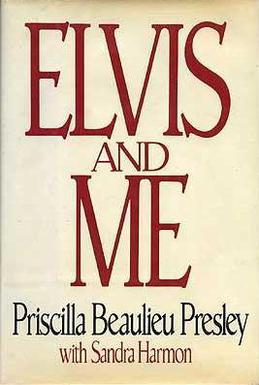
Elvis and Me: The True Story of the Love Between Priscilla Presley and the King of Rock N' Roll is a 1985 memoir written by Priscilla Presley, with Sandra Harmon. In the book, Priscilla talks about meeting Elvis Presley, their marriage, and the factors and issues that led to the couple's divorce.
The Memphis Mafia was the nickname given by the media to a group of Elvis Presley's friends, associates, employees and cousins whose main functions were to accompany, protect, and serve Presley from the beginning of his career in 1954 until his death in 1977. Several members filled practical roles; for instance, they were employed to work for Presley as bodyguards or on tour logistics and scheduling. In these cases Presley paid salaries, but most lived off fringe benefits such as gifts, cars, houses and bonuses. Over the years, the number of members grew and changed, but for the most part there was a core group who spent much time with Presley.

From Elvis in Memphis is the ninth studio album by American rock and roll singer Elvis Presley. It was released by RCA Records on June 2, 1969. It was recorded at American Sound Studio in Memphis in January and February 1969 under the direction of producer Chips Moman and backed by its house band, informally known as the Memphis Boys. Following the success of Presley's TV special Elvis and its soundtrack, the album marked Presley's return to non-soundtrack albums after the completion of his film contract with Metro-Goldwyn-Mayer.

Bad Nauheim is a town in the Wetteraukreis district of Hesse state of Germany.
Charles Franklin Hodge, better known as Charlie Hodge, was an American singer, vocal coach and musician who was a confidant and best friend of Elvis Presley, and lived at Graceland.

Elvis Is Back! is the fourth studio album by American singer Elvis Presley, released on April 8, 1960 by RCA Victor. It was Presley's first album of new material since 1958's King Creole soundtrack, as well as his first to be recorded and released in stereophonic sound. The album marked Presley's return to music after his discharge from the U.S. Army.

Elvis Presley Enterprises, Inc. (EPE) is a corporate entity created by "The Elvis Presley Trust" to conduct business and manage its assets, including Graceland. EPE's business extends far beyond the Graceland operation, and includes worldwide licensing of Elvis-related products and ventures, the development of Elvis-related music, film, video, television and stage productions, the ongoing development of EPE's Internet presence, the management of significant music publishing assets, and more.

Elvis Presley had many close relationships throughout his career. The strongest of all his personal relationships, by far, was that he had with his mother Gladys, as described below.
Welcome Home Elvis is a 1960 television special on the ABC Television Network starring Frank Sinatra and featuring Elvis Presley in his first televised appearance following his military service in West Germany. The special, commonly known as Welcome Home Elvis, was officially titled It's Nice to Go Traveling, a reference to the Sinatra song "It's Nice to Go Trav'ling". This was Presley's first TV appearance in three years. This was also Frank Sinatra's fourth and final Timex sponsored outing for the 1959–60 television season.
The FBI files on Elvis Presley consist of records kept by the Federal Bureau of Investigation concerning Elvis Presley. These records consist of 683 pages of copies of letters from members of the public commenting on his performances, newspaper clippings, and documents reporting that Presley was the target of extortion attempts.

Lisa Marie Presley was an American singer and songwriter. She was the only child of singer and actor Elvis Presley and actress Priscilla Presley, as well as the sole heir to her father's estate after her grandfather and her great-grandmother died. Her musical career consisted of three studio albums: To Whom It May Concern (2003), Now What (2005) and Storm & Grace (2012), with To Whom It May Concern being certified gold by the Recording Industry Association of America. Presley also released non-album singles, including duets with her father using archival recordings.

"You'll Be Gone" is a song recorded by Elvis Presley and published by Elvis Presley Music and released in 1965 on the Girl Happy soundtrack album and as a 45 single. The song was recorded in 1962 and was one of very few which Presley was involved in writing; his co-writers were his bodyguard Red West and Charlie Hodge. The other song that Elvis Presley composed was "That's Someone You Never Forget" in 1961 with Red West, which was on the Pot Luck LP released in 1962. The song was recorded on Sunday, March 18, 1962, at RCA Studio B in Nashville, Tennessee.
Mike Stone is an American martial artist, retired karate fighter, fight choreographer, stuntman, actor, author, and motivational speaker.

Elvis is a 2022 epic biographical drama film co-produced and directed by Baz Luhrmann, who co-wrote the screenplay with Sam Bromell, Craig Pearce, and Jeremy Doner. It chronicles the life of the American rock and roll singer and actor Elvis Presley under the management of Colonel Tom Parker. It stars Austin Butler and Tom Hanks as Presley and Parker, respectively, with Olivia DeJonge, Helen Thomson, Richard Roxburgh, David Wenham, Kodi Smit-McPhee, and Luke Bracey in supporting roles.

Priscilla is a 2023 American biographical drama film written, directed, and produced by Sofia Coppola, based on the 1985 memoir Elvis and Me by Priscilla Presley and Sandra Harmon. It follows the life of Priscilla and her complicated romantic relationship with Elvis Presley.

Elvis Aaron Presley, popularly known by his first name Elvis, was an American singer and actor. He was born in Tupelo, Mississippi and relocated to Memphis, Tennessee with his family at age 13. His music career began there in 1954, recording at Sun Records with producer Sam Phillips, who wanted to bring the sound of African-American music to a wider audience. Presley, on rhythm acoustic guitar, and accompanied by lead guitarist Scotty Moore and bassist Bill Black, was a pioneer of rockabilly, an uptempo, backbeat-driven fusion of country music and rhythm and blues. In 1955, drummer D. J. Fontana joined to complete the lineup of Presley's classic quartet and RCA Victor acquired his contract in a deal arranged by Colonel Tom Parker, who would manage him for more than two decades.



